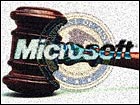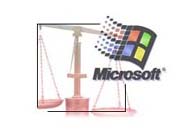|
Court denies MSFT appeal
|
 |
October 9, 2001: 12:24 p.m. ET
Without comment, the High Court says it will not hear the antitrust case.
|
NEW YORK (CNNmoney) - The United States Supreme Court said Tuesday it will not consider Microsoft's request that it overturn a lower court's ruling that found the software maker guilty of violating U.S. antitrust laws.
Microsoft had asked the Supreme Court to overturn a ruling handed down by a federal appeals court in June of this year that upheld a U.S. District Court Judge's ruling that Microsoft was an illegal monopoly that harmed consumers and quashed competition.
The Supreme Court offered no comment on its decision not to hear the case, which has been returned to the district court for further proceedings.
The U.S. Court of Appeals for the District of Columbia in late June had overturned a lower court's order by U.S. District Court Judge Thomas Penfield Jackson that Microsoft be broken into two companies as a remedy for anticompetitive practices.
| |

|
|
Click here for CNNMoney.com's special report: Microsoft on trial | |
At the same time, it upheld the lower court's conclusion that Microsoft has a monopoly in the market for computer operating systems and maintains that monopoly power by anticompetitive means in violation of U.S. antitrust laws.
In its ruling, the appeals court said the original lower court judge who had ordered the breakup of the company had conducted himself improperly in the case, which is the grounds on which Microsoft had sought the Supreme Court review.
In late August, the case was sent back to the U.S. District Court and assigned to a different judge for reconsideration of the remedy as well as other aspects of the original order - including whether Microsoft acted illegally by tying the software code for its Internet Explorer Web browser to its dominant Windows operating system.
The U.S. Justice Department already has said it will not continue to pursue a breakup, choosing instead to seek changes in the way the software maker conducts business, similar to those the original trial judge imposed on the company in June 2000 but were postponed pending the appeal.
A spokeswoman said the Justice Department is satisfied with the Supreme Court's decision not to take up the matter.
"We're pleased with the court's decision," said Justice Department spokeswoman Gina Talamona. "We'll continue our progress in district court," she said.
Microsoft spokesman Jim Desler said the company had known from the outset that its chances for a Supreme Court review were limited by the sheer volume of cases that the High Court is asked to consider.
"We'll just have to continue at the district court level," Desler said. He added that Microsoft has been in settlement talks with the Justice Department but declined to comment on how they are progressing.
Among the conduct remedies Judge Jackson originally imposed were: prohibiting Microsoft from punishing hardware and software companies working on competing products; prohibiting it from favoring computer companies and software developers that helped Microsoft exclude competitors; requiring Microsoft to license Windows to PC makers under uniform prices and terms according to a publicly available schedule; and barring Microsoft from interfering with the way PC makers set up startup screens, the Windows desktop, preferences, and Internet connection wizards.
The new judge, Colleen Kollar-Kotelly, has ordered Microsoft and the Justice Department into intensive settlement talks. Saying the talks should proceed "24 hours a day, seven days a week," she set a deadline of Nov. 2.
If the two sides fail to reach an agreement by then, Kollar-Kotelly said a hearing on what steps to take to curb Microsoft's abuses of antitrust law will start in March 2002.
Shares of Microsoft (MSFT: down $2.65 to $55.39, Research, Estimates) were trading more than 3 percent lower Tuesday morning on Nasdaq. 
|
|
|
|
|
 |

|

